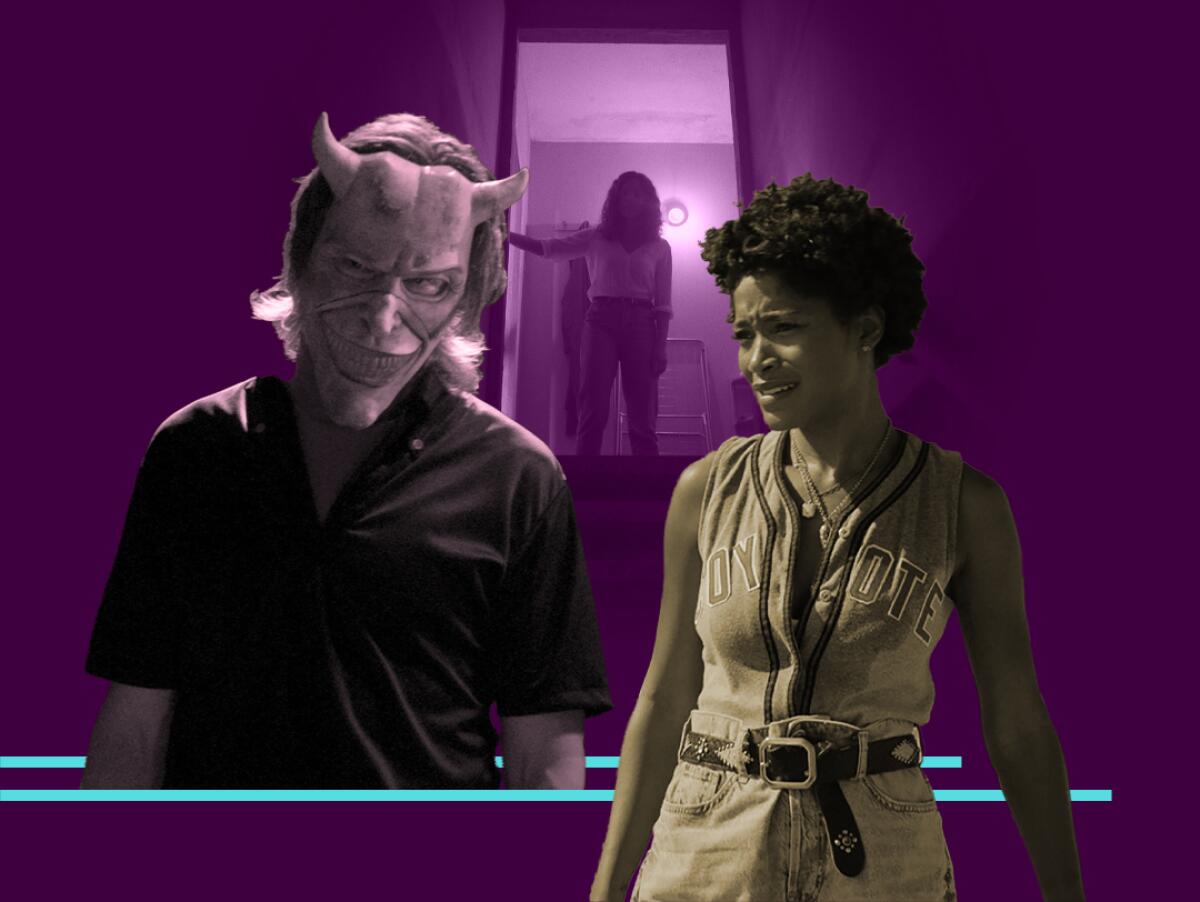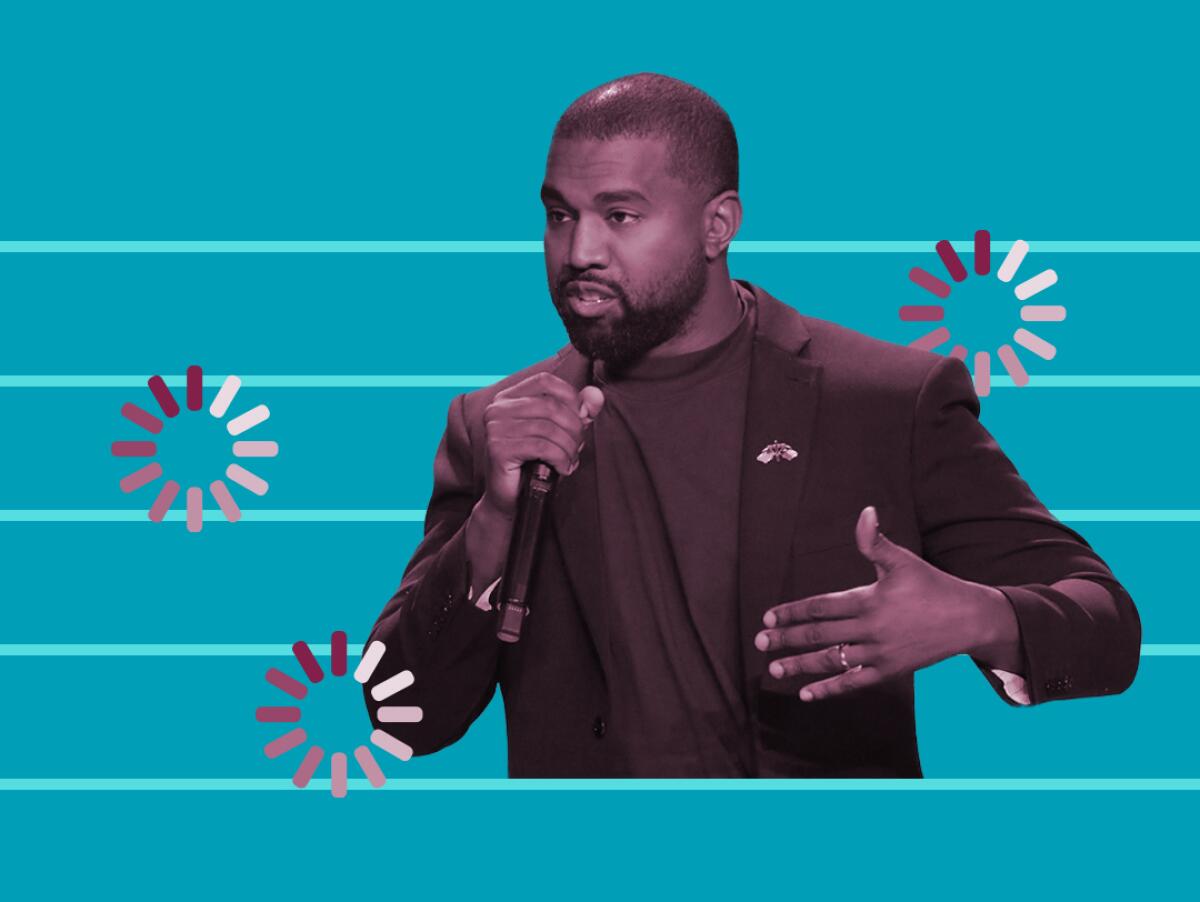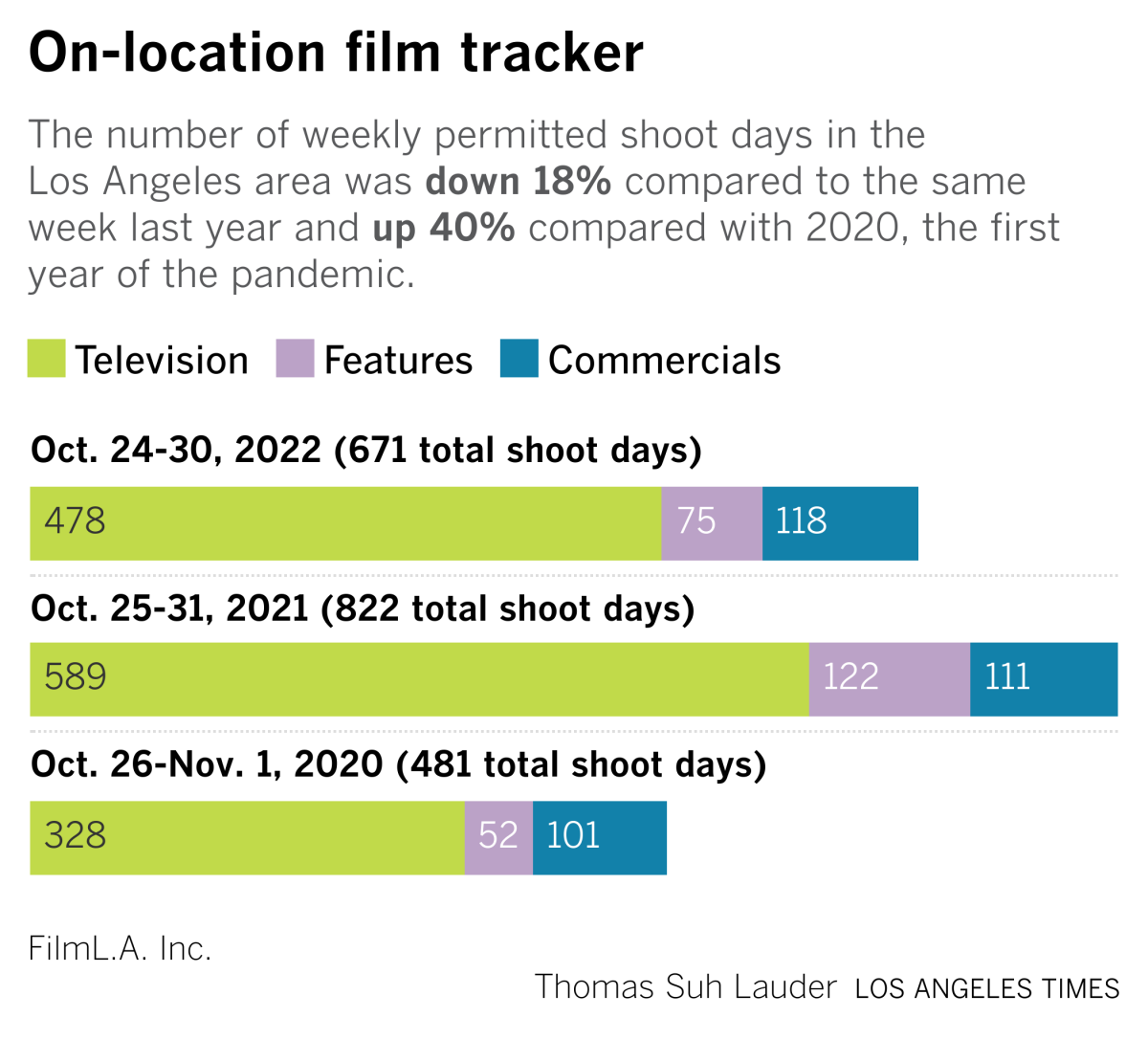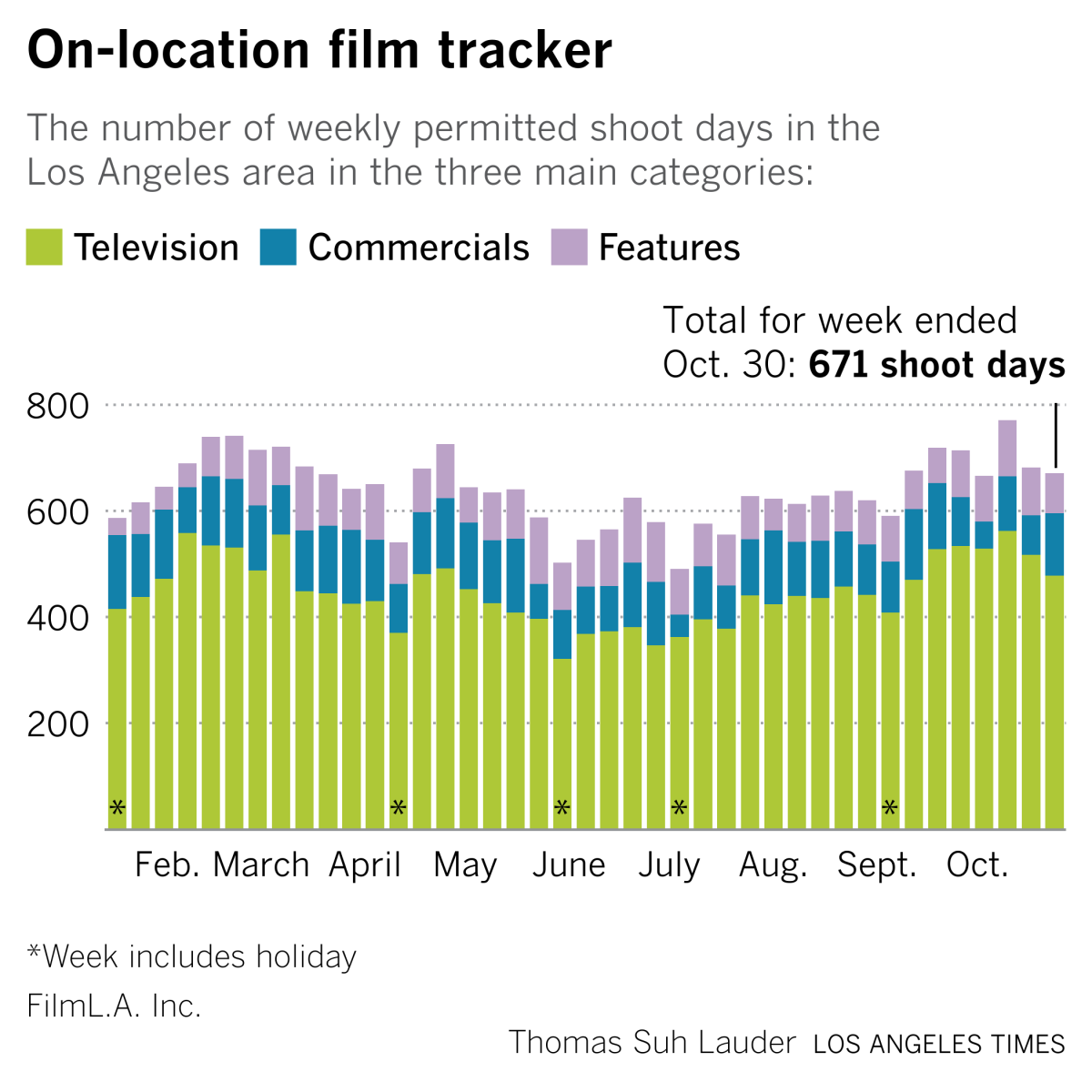Dear Hollywood: Don’t ruin the horror movie hot streak

- Share via
Welcome to the Wide Shot, a newsletter about the business of entertainment. Sign up here to get it in your inbox.
Hope Wide Shot readers had a fun Halloween! There’s going to be a lot of chatter about “Black Panther: Wakanda Forever’s” box office prospects in the next couple of weeks, especially after the effusive early reactions coming out of Wednesday’s world premiere in Hollywood.
Having seen the movie now, all I’ll say is that the opening-weekend numbers are going to be the least interesting aspect of the conversation related to this film, and that’s coming from someone who has occasionally obsessed over box office stats. It’s going to make an awful lot of money; it’s just a matter of degree. There’s much else to dig into, including the handling of Chadwick Boseman’s death, Oscar hopes and the Marvel-ness of it all, and I’m excited for people in the real world to see it.
In the business of entertainment and media, as you may have heard, Elon Musk owns Twitter now (“Welcome to Hell, Elon,” as the Verge put it), CNN is making changes, the DOJ won its case to block a huge publishing merger and YouTube gave us more ominous news for the online ad market. Elsewhere, James Cameron’s “Avatar: The Way of Water” is expected to be (gulp) over three hours long. These aren’t just blockbusters, they’re bladder-busters. On with the newsletter, which, unlike Twitter verification, remains free for the foreseeable future.
Will Hollywood ruin the horror boom?
Just in time for Halloween, I wrote a piece analyzing horror’s hot streak at the box office and how the genre has become not only a rare safe bet for studios but also a much-needed hotbed of creativity for filmmakers. The story was mainly an excuse for me to talk about “Barbarian,” “X,” “Nope” and “Bodies Bodies Bodies.” I’m kidding. Sort of.
But truly, horror has produced some remarkable success stories in 2022, recently including Paramount Pictures’ “Smile” ($186 million worldwide) and the tiny indie pic “Terrifier 2,” which held strong over Halloween weekend to land at No. 8 with $1.8 million for a total of more than $7.6 million so far.
“The Black Phone” and “Sinister” screenwriter C. Robert Cargill, who’s been banging this drum for a while, supplied one of the money quotes for the story.
“Horror is the last remaining genre that doesn’t require IP to be successful and doesn’t require big names or big budgets to be successful,” Cargill said. “It circumvents all the problems that Hollywood usually has with making films and getting them in front of audiences.”
Is Cargill right? Let’s look at the domestic box office charts, as provided by Box Office Mojo, with numbers up-to-date through Sunday. How many of them are working commercially without an established intellectual property or A-list actors?
The top eight movies so far this year are all big-budget action, superhero or animated movies. All are either sequels or reboots. None of that is remotely surprising. No. 9 is “Elvis,” a studio tentpole with a hefty budget for its musical biopic genre ($85 million) and a major star (Tom Hanks). No. 10 is “Uncharted” (very much star-driven, with Tom Holland and Mark Wahlberg).
After Jordan Peele’s “Nope” at No. 11, we get “Lightyear” (animated/spinoff), “Black Adam” (DC/Dwayne Johnson), “The Lost City” (Sandra Bullock/Channing Tatum) and “Bullet Train” (Brad Pitt).
The next original live-action non-horror movie on the list is Sony’s “Where the Crawdads Sing,” based on a massive bestseller, at No. 20. Down further come some true originals, with A24’s “Everything Everywhere All at Once” at No. 25, followed by Sony’s “The Woman King” (Viola Davis) and “Dog” (Tatum, again).
So it’s not as if films in genres other than horror and action are doomed to failure or straight-to-streaming no-man’s-land. It’s just that adult dramas, original thrillers and comedies tend to need a little something extra in order to get audiences’ attention, like a huge star or two. “Ticket to Paradise,” after all, is having a strong run thanks to George Clooney and Julia Roberts, doing solid business in the U.S. after a significant head start overseas.
But it’s clear that scary movies have proved unusually resilient at the box office and beyond, with cultural and commercial relevance extending to streaming services, both mainstream (Netflix) and niche (Shudder).
Cargill also brought up a crucial point about the recent surge in high-quality horror cinema, reminding us to never underestimate the studios’ ability to ruin a good thing by flooding the market.
Horror has gone through boom-and-bust cycles before. There was the slasher wave of the late ’70s and ’80s, followed by a boom due to the popularity of home video that allowed movies to make back their budgets more easily. But that also resulted in a glut of cheap schlock that sent the genre into a slump until “Scream” brought back slashers in 1996, followed by “The Blair Witch Project” found footage trope and the torture-porn explosion with “Saw” and “Hostel.”
Cargill worries that studios will take the wrong lessons from the current horror renaissance and start simply churning out lousy movies just because they can feature a scary face on the poster, the way “The Black Phone” and “Smile” did.
“My chief concern now is that we don’t allow the studios to go whole hog and destroy this beautiful thing that we’ve got all of a sudden,” Cargill said. “We need to make sure that we keep focusing on entertainment and quality, and that’s the one thing that I think we need to think about when we’re talking about how great a period of time we’re in now.”
Since streaming has usurped the role of the bottomless straight-to-video bargain bin, Hollywood has no shortage of opportunities to blow it.
Stuff we wrote

- Why Spotify and Apple Music haven’t pulled Kanye West’s songs. As streaming services face pressure to cut ties with Ye, industry observers say pulling his music from the platforms could be complicated, Wendy Lee writes.
- Also: Here are the companies that have cut ties with the rapper over his antisemitic comments.
- From elsewhere: Forbes says Ye is no longer a billionaire.
- For some celebs, pay-to-play Twitter verification is the last straw. Elon Musk is already floating major changes for Twitter as he begins his first week as owner of the social media platform. Verified users may soon be asked to pay $20 per month for the privilege.
- Can a new morning show with Don Lemon help turn around CNN’s fortunes? Lemon, Poppy Harlow and Kaitlan Collins will co-anchor “CNN This Morning,” the first major programming change at the network under new boss Chris Licht, reports Stephen Battaglio. What does it say about Licht’s strategy for the network, as the executive cuts back on things like commissioning original films and series?
- Side note: It’ll be pretty ironic if the documentary “Navalny” ends up with an Oscar nomination after the news of CNN’s cuts.
- The latest on “Rust.” A year after the tragedy that killed Halyna Hutchins, the Santa Fe County sheriff has turned over the investigation file to the district attorney.
- ICYMI: ESPN sells majority stake in X Games. James Gunn and Peter Safran will run DC Studios for Warner Bros.
Number of the week

Taylor Swift’s “Midnights” had an extraordinary first week.
The singer-songwriter’s new collection of songs scored 1.578 million equivalent album units (a metric that includes streaming) earned in the U.S. during the week that ended Oct. 27, according to Luminate Data, formerly known as Nielsen Music. It’s the biggest sales tally for an album in seven years. The last record to enjoy a bigger week was Adele’s “25,” which launched with 3.482 million units in late 2015.
Billboard breaks down the numbers for “Midnights”: Actual album sales were 1.140 million, with physical units shipped comprising 980,000 (575,000 on vinyl, 395,000 on CD and 10,000 on cassette) and digital album downloads totaling 161,000. Streaming equivalent album units came in at 419,000. Fun fact: Swift had the largest week for an album on vinyl since Luminate/Billboard began tracking music sales in 1991. Swifties for physical media is a movement I can get behind.
“Midnights” also logged the third-largest streaming week ever for an album, coming in behind only Drake’s “Scorpion” and “Certified Lover Boy.”
Another data point on Swift’s dominance: The artist just became the first ever to lock down the 10 top spots in the Hot 100 in one week.
Best of the web
— Spotify wants to get into audiobooks but says Apple is in the way. (New York Times)
— What Moneyball-for-everything has done to American culture. (The Atlantic)
— Inside the merger that could have ended HBO as we know it. (Vanity Fair)
— Jeffrey Katzenberg tried to pitch ‘West Side Story’ with cats to Leonard Bernstein. (IndieWire)
— Haruki Murakami: Where my characters come from. (The Atlantic)
Films shoots
On-location shoot days in Los Angeles continued to track below the same period of time in 2021, as the production crunch from earlier in the pandemic eased. Some studios have cut back on spending because of corporate pressures, as well.


Finally ...

I’m a lifelong Weird Al fan, so this profile was a treat to read, containing quotes from Evan Rachel Wood, Dr. Demento and one of the hosts of the “Chapo Trap House” podcast. As writer Alex Pappademas observes, “Weird Al Yankovic has outlasted the cultural relevance of many of the artists he’s parodied. I mean, remember Crash Test Dummies? “This may be the weirdest thing about Weird Al in 2022, nearly 40 years after ‘Ricky,’” Pappademas writes. “He’s become a legacy artist.” The satirical “biopic,” “Weird: The Al Yankovic Story,” debuts Friday on the Roku Channel.
Inside the business of entertainment
The Wide Shot brings you news, analysis and insights on everything from streaming wars to production — and what it all means for the future.
You may occasionally receive promotional content from the Los Angeles Times.




